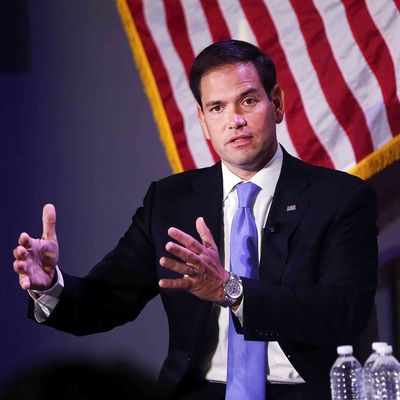
Until recently, Marco Rubio has concealed his civil libertarian impulses beneath thick layers of neoconservative bluster. But Rubio’s heretofore hidden fears of government overreach against terrorism came to the surface on Sunday, when Jake Tapper asked about a proposal to restrict sales of guns and explosives to people on the no-fly list. Rubio cast the idea as a horrifying imposition upon freedom:
Because there are — the majority of people on the no-fly list are oftentimes people that basically just have the same name as somebody else who don’t belong on the no-fly list.
The — former Senator Kennedy — Ted Kennedy once said he was on a no- fly list. I mean, there are — I — we — there are journalists on the no-fly list. There are others involved in the no-fly list that wind up there.
These are everyday Americans that have nothing to with terrorism. They wind up on the no-fly list. There’s no due process or any way to get your name removed from it in a timely fashion. And now they’re having their Second Amendment right being impeded upon.
If these were perfect lists, that would be one thing. But there are over 700,000 Americans on some watch list or another that would all be captured under this amendment the Democrats offered. And that’s the problem.
Rubio does not completely dismiss the notion of preventing suspected terrorists from obtaining extremely deadly weapons. Instead he subjects the notion to very strict levels of scrutiny. He might accept “perfect lists” of suspects, but not flawed lists. In reality, the no-fly list does not contain 700,000 Americans. It does contain plenty of non-terrorists though.
Thus we are faced with a trade-off between liberty and security. One solution would be to work to improve the list, though Rubio — despite his belief that the list is catastrophically flawed — has no proposals to do so. Another solution, favored by many people on the left, would be to scrap the no-fly list altogether as a dangerous abuse of state power. Rubio does not support that approach, either. The Rubio position — which, as is nearly always the case, represents the consensus view within his party — is that it is perfectly appropriate for the government to use a secret list to restrict air travel but not the purchase of guns and explosives.
It may be true, as Rubio pointed out in his interview, that restricting gun sales would not have prevented the recent murders in San Bernardino. On the other hand, there’s also little reason to believe that Rubio’s preferred solution of more intensive metadata collection would have prevented it, either. Al Qaeda had an odd fixation on airplane-based terrorism, and attacks of this nature required the kind of central planning that American intelligence could detect. ISIS seems to prefer the cheaper and more straightforward method of encouraging people to shoot up crowds of innocent people. All ISIS really requires to execute these attacks is to inspire followers abroad through propaganda. A homeland-security strategy that prioritizes airplane safety, and ignores the absurdly simple procurement of weapons and ammunition, has no bearing on the threat at hand.
One can rationally defend different preferences in the trade-off between freedom and security. What possible argument could justify denying people the right to buy an airplane ticket but allowing them to purchase weapons of mass murder?






























